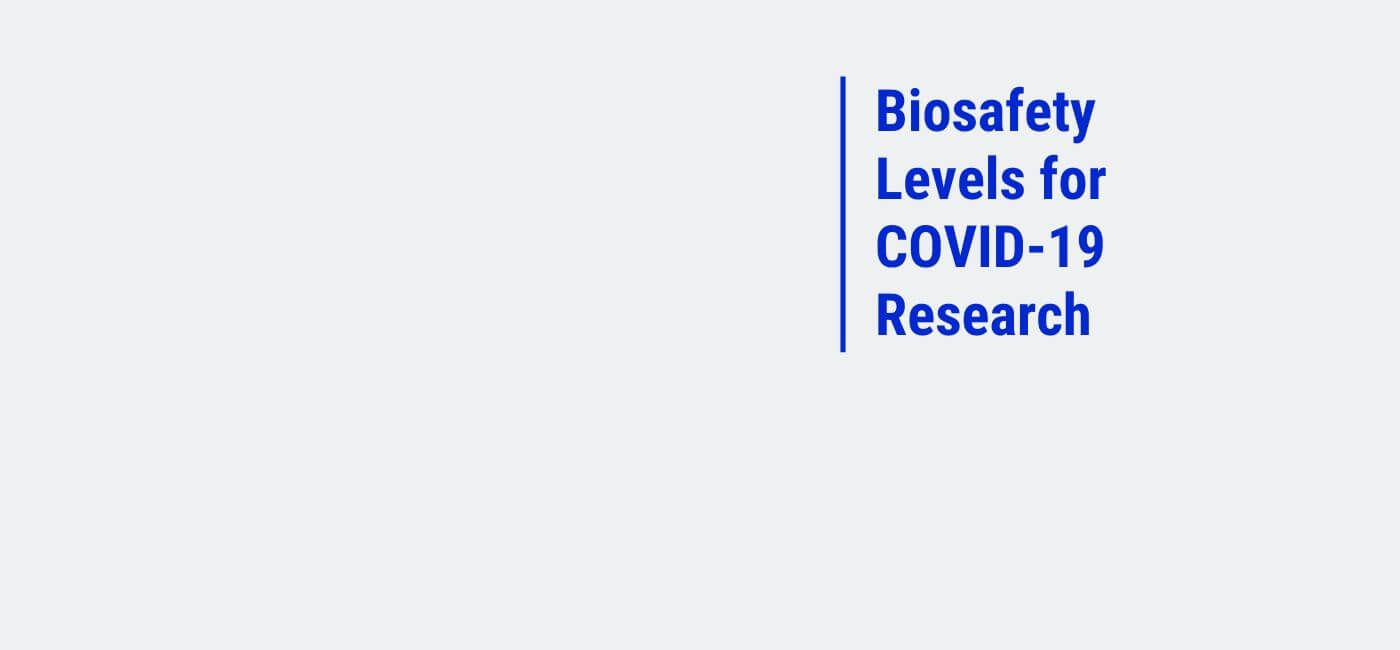
The recent spread of the novel COVID-19, or ‘coronavirus’, has resulted in an increase in biosafety research efforts surrounding the virus and finding a potential treatment option. Coronaviruses cause respiratory disease in mammals and birds, though certain coronavirus species can be more infections than others.
COVID-19 is one of these more infectious varieties and has recently caught media attention due to its rapid global spread. COVID-19 causes moderate respiratory tract infections in humans, with more than 94% of patients eventually recovering with no lasting symptoms.
Unfortunately, individuals with compromised immune systems, the elderly, and people with pre-existing conditions may be more vulnerable, and as of right now, confirmed deaths related to COVID-19 sit at 6%. As such, proper containment of COVID-19 is imperative to public health and safety, particularly in testing and research facilities adhering to the right biosafety level for COVID.
Personnel working in close contact with COVID-19 infectious agents must follow proper handling procedures, and labs looking to conduct coronavirus research must be compliant with current biosafety requirements.
What BSL is Coronavirus?
Though certain species of coronavirus can be studied in biosafety level 2 labs, according to the CDC COVID-19 requires BSL-3. COVID-19 can be contracted via inhalation, and BSL-3 labs are equipped to contain viral airborne agents.
BSL-3 labs have strict requirements of their staff, including continued medical oversight to prevent the spread of infectious diseases.
BSL-3 labs should be isolated from the larger facility, either by a series of hallways and double doors or as a free-standing building. This precaution is necessary to prevent accidental exposure of non-lab personnel and the surrounding environment to infectious agents like COVID-19.
Isolation of BSL-3 labs also includes a special ventilation system designed to filter out and send contaminated air away from lab and facility personnel.
Use Good Microbiological Practice and Procedure
Labs researching or testing materials with high concentrations of COVID-19 virus should use good microbiological practices and procedures to avoid exposing lab personnel and the outside environment to the infectious virus. This includes ensuring that rules applying to COVID’s biosafety level are followed at every step.
Good microbiological practice and procedures include:
- Storing food, drinks, lab coats, and personnel belongings outside of the lab environment
- Never putting pens, pencils, pipettes, or other small items in mouths
- Thorough handwashing after all handling of biological materials, before entering the facility, and upon exiting
- Proper labeling of biological materials
- Keeping work areas clean and tidy and free from clutter
- Removal of all jewelry that could tear gloves, or could easily become contaminated
Use Biosafety Cabinets
Biosafety cabinets and fume hoods should always be used when testing materials contaminated with COVID-19 virus. Biosafety cabinets draw airborne particles and droplets away from researchers and the lab environment to be filtered using high-efficiency particulate air filters before being recirculated.
Biosafety cabinets ensure airborne viruses like COVID-19 do not escape into the work area where they could easily be inhaled by lab personnel.
At OnePointe Solutions, we offer a range of biosafety cabinets and fume hoods for laboratories that can be installed around your facility’s existing HVAC system. Our biosafety cabinets are resistant to heat, chemicals, water, and bacteria buildup, featuring seamless, non-porous, and smooth design.
We can include optional features like chemical storage, flammable cabinets, and state of the art instrumentation to create custom solutions for your unique lab needs. If you are working on building or renovating a stationery or mobile lab for coronavirus related research and require biosafety cabinets and other lab furniture, let us know and we can discuss accommodating your budget and timeline.
Avoid Producing Aerosols
When testing COVID-19, procedures that generate aerosols or droplets should be avoided. Similarly, in order to avoid accidental inhalation or exposure to aerosols or droplets generated by research activities, proper protective measures should always be taken by all laboratory personnel.
Examples of procedures that have the potential to produce aerosols and droplets:
- manipulating or moving sealed centrifuge cups
- blending or vigorous shaking
- sonic disruption
- pressure changes
If these procedures must be performed, personnel with demonstrated ability should be charged with the task, and all actions should be performed within a functioning biosafety cabinet. If best practices and good techniques are used, the formation of droplets and aerosols can be reduced or avoided.
Similarly, always avoid actions that may result in splashes and spills, for instance, handling leaking samples or mixing vigorously in an uncontained environment.
Wear Appropriate Personal Protective Equipment
When working with highly-infections biological agents, wearing appropriate personal protective equipment is key to maintaining staff health and safety. Inhalation, exposure through oral contact with contaminated objects, and the transfer of COVID-19 from hands to face can all result in contraction of coronavirus, necessitating a quarantine with extended medical oversight and care for the infected staff member.
Similarly, personal protective equipment should be removed and disposed of or sanitized prior to exiting the lab. Pathogens and airborne illness can travel on clothing and surfaces, and if brought outside the isolated lab environment, could pose a risk to public health in the surrounding areas.
To avoid exposing the community or larger facility to COVID-19 virus, all personnel should follow proper wash-in/wash-out procedures, and leave all personal belongings, foods, and beverages outside of the lab environment to avoid contamination and exposure.
Need to Build or Expand Your Coronavirus Research Lab?
Our team of engineers and designers can create the biosafety laboratory that meets your coronavirus research requirements. We take this outbreak very seriously.
Any way we can help curb the spread and accelerate and facilitate the growth of research we are eager to discuss. Call us at (866) 612-7312, fill out an online form, or chat with us to learn more about how we can help.


